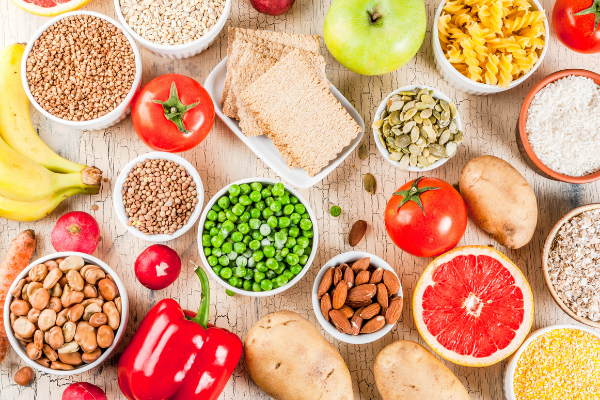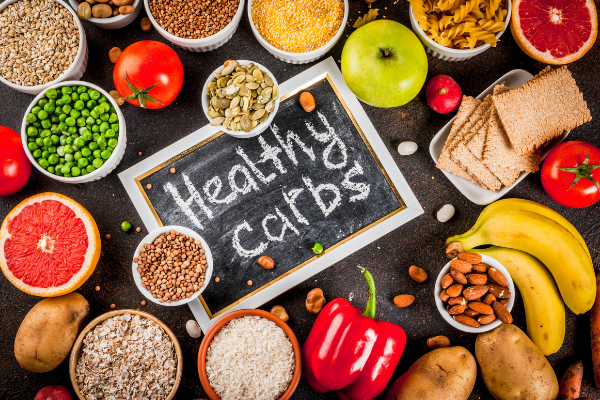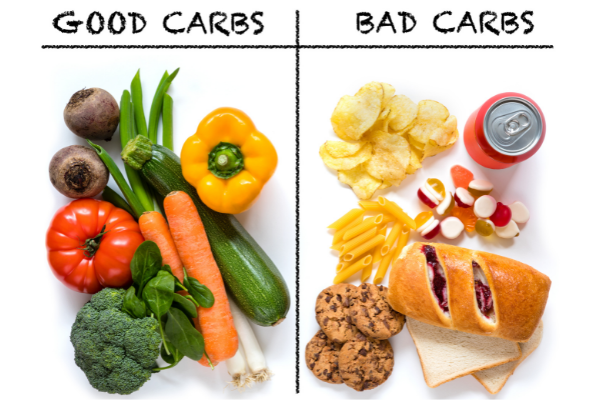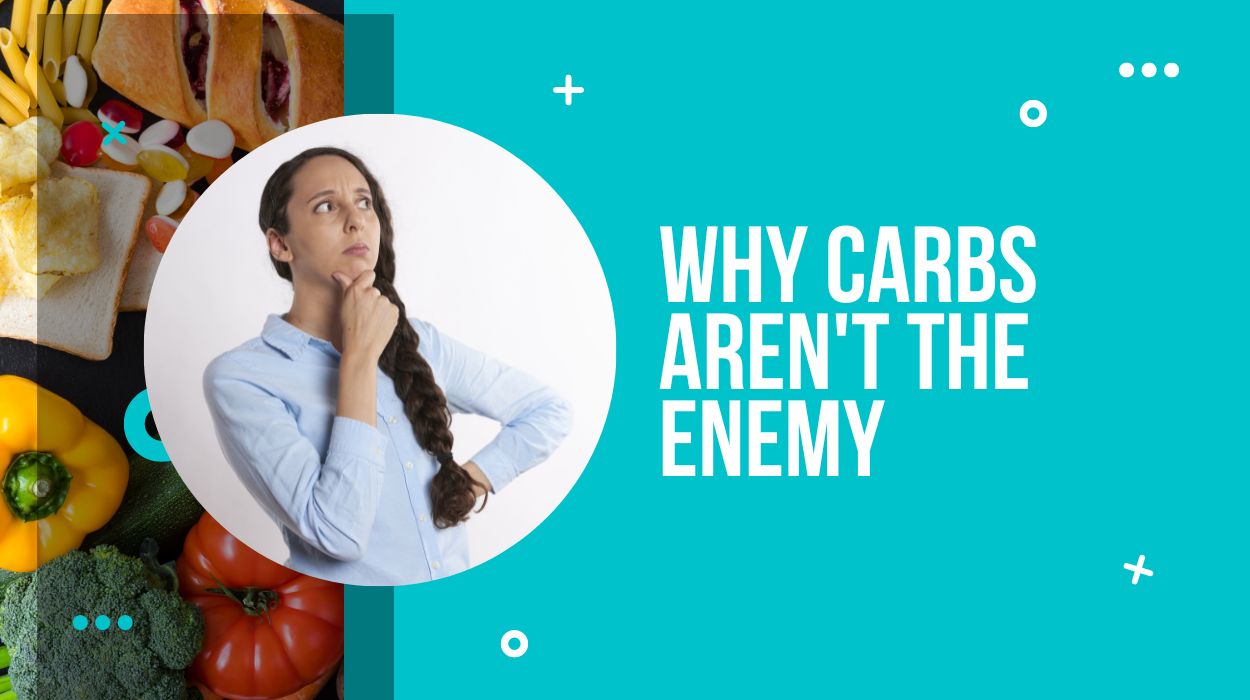Have you ever heard someone saying you should lower your carbs when you are on a diet?, or have you come across low carb or no-carb diets on the internet? Do these make you wonder why exactly are carbs hated so much?
Let us help you understand why the poor carbs have been wrongly blamed all these years by explaining what carbs are? What do they do for our bodies? And why are they not the enemy! So let’s dive right into it!
What are carbs? What do they do?

Carbs or carbohydrates are sugar molecules found in the food we eat. Along with proteins and fats, it forms the trinity of the primary nutrients you gain while eating food.
Let’s make it simple, to perform any activity, you need energy, energy is derived by utilizing glucose, and you get glucose from carbs. So simply stating carbs are the main source of energy for your body and the nutrient that keeps your body functioning!
So if carbs are so important, why do people hate carbs so much?
There is a myth that carb leads to weight gain, which might have sprung from analyzing the effect of carbs on your blood insulin levels. When you eat simple carbs, your body notices a spike in the glucose and produces more insulin; insulin causes your body’s cells to absorb the glucose, which, if it is in excess, turns into fat and leads to weight gain. But whoa, wait, what exactly are simple carbs?
Let’s start by understanding the two different types of carbs-
2 Types of Carbohydrates

Mainly there are two types of carbohydrates based on the structure of their molecules – simple and complex-
1. Simple carbs
Simple carbohydrates, as the name suggests, are simple structured carbohydrates. They consist of 1 or 2 molecules of sugar. Due to the lower number of molecules, these can be broken down easily by the body and get absorbed in your blood, quickly raising your blood sugar levels, and this is precisely why they are fattening.
Simple carbs are great for getting a quick energy boost but may become your enemy if you consume them and do not work towards utilizing the sugar, as this will get stored by your body in the form of fats which will lead to weight gain.
What are the foods that come under simple carbs? Basically, include all your junk and sugary foods that were categorized as non-healthy in your biology textbooks; some examples of simple carbs-
- Cakes
- White rice
- Biscuits
- Chocolates
- Sugary drinks
No, wait, dont start throwing out all of these items from your pantry; they are not damaging until you exceed the limit. Eating them in moderation and making them a part of your diet is essential and not fattening!
2. Complex carbs
Complex carbs are well complex in their molecule structure; they consist of long chains of sugar molecules. When you eat complex carbs, your body cannot break down the carbs in one go; instead, it takes a long time to convert the complex structure into glucose. While the body breaks down the carbs, it gradually releases sugar into the blood, giving you continuous energy.
Complex carbs include all the healthy stuff that your mom wants you to eat. some examples of complex carbs are-
- Brown rice
- Wheat
- Oats
- Quinoa
- Corn
Now that we know what carbs are and their types, let’s look at how you can incorporate them into your diet without making your weight shoot up.
How to Manage your Carb intake Without Gaining Weight

Understanding one thing excluding carbs from your diet will not cut off all sources of energy for your body; if that happened, all the no-carb diet followers would be just lying around all day. When you cut down on your carbs, your body changes its energy source to the stored carbs, which are, you guessed it right – fats; this is why no-carb diets are known to show instant benefits. But if you cut down on carbs, you will also miss out on the various benefits of carbs!
Your body requires between 225 to 335 grams of carbs every day, but this figure differs from person to person based on their lifestyle. If you want to lose weight, you can drop down to 100- 150 gms of carbs every day.
The basic idea is to include more complex carbs in your diet, so let’s work out a middle path; allow us to help you by providing these tips-
1. Switch to Wholegrain
To get crabs and not gain weight, swap your food with its healthier versions, for example Like pasta-? Switch to its whole wheat version, like white bread? Switch to its whole grain version- wholegrain bread. This way, you still get the carbs but the healthier version, which will help keep you energized all day!
2. Eat vegetables
Eat lots of veggies! These have a good amount of carbs while being packed with fiber and other good things that your body loves! Whip up a healthy salad for lunch every day to keep you full, and your body energized.
3. Include plant-based sources
Include the healthy feel-good stuff like quinoa, oats, corn, etc., into your diet; these are superfoods that you can eat once and will keep you energized the whole day!
4. Cut down on processed foods-
follow the mantra eat everything that appears naturally in the environment and can be cooked; anything processed or artificial simply needs to be avoided.
5. Eat cakes but on a limit-
Do not curb your cravings for that tasty slice of chocolate cake; eat simple carbs but balance it in your diet so that it does not attack your daily set carb limit.
6. A balanced diet
A balanced diet is essential “oh, carbs are good, lemme just eat only carbs” no! Segregate all nutrients based on the optimum amount required and then create a diet plan for yourself; you can also consult a dietician to help you through this.
FAQs
Q. What are the risks involved in a no-carb diet?
By eliminating carbs entirely from your diet, you might be inviting conditions like arrhythmias, osteoporosis, kidney damage, cancer risk, lipid abnormalities, and incapability of physical activity. Though this is low, there is also a risk of sudden death.
Q. Do carbs lead to diabetes?
Yes, eating excessive carbs every day can lead to diabetes, but you can avert this risk by consuming an optimum amount of carbs every day.
You May Like to Read:
Conclusion
Did we mention that carbs make you happy? After all, carbs keep your stomach full, and it’s hard being grumpy on a filled stomach! So the next time someone tells how bad carbs are, counteract them with your knowledge of what carbs are, their types, and how they could include it in their diet without causing weight gain!
Let us know in the comments which point you found most helpful!


